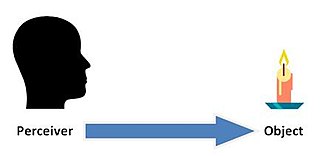Related Research Articles
In analytic philosophy, anti-realism is an epistemological position first articulated by British philosopher Michael Dummett which encompasses many varieties such as metaphysical, mathematical, semantic, scientific, moral and epistemic. The term was coined as an argument against a form of realism Dummett saw as 'colorless reductionism'.

Epistemology is the branch of philosophy concerned with knowledge. Epistemologists study the nature, origin, and scope of knowledge, epistemic justification, the rationality of belief, and various related issues. Epistemology is considered one of the four main branches of philosophy, along with ethics, logic, and metaphysics.
Foundationalism concerns philosophical theories of knowledge resting upon justified belief, or some secure foundation of certainty such as a conclusion inferred from a basis of sound premises. The main rival of the foundationalist theory of justification is the coherence theory of justification, whereby a body of knowledge, not requiring a secure foundation, can be established by the interlocking strength of its components, like a puzzle solved without prior certainty that each small region was solved correctly.
Platonic idealism usually refers to Plato's theory of forms or doctrine of ideas. It holds that only ideas encapsulate the true and essential nature of things, in a way that the physical form cannot. We recognise a tree, for instance, even though its physical form may be most untreelike. The treelike nature of a tree is therefore independent of its physical form. Plato's idealism evolved from Pythagorean philosophy, which held that mathematical formulas and proofs accurately describe the essential nature of all things, and these truths are eternal. Plato believed that because knowledge is innate and not discovered through experience, we must somehow arrive at the truth through introspection and logical analysis, stripping away false ideas to reveal the truth.
Reality is the sum or aggregate of all that is real or existent within a system, as opposed to that which is only imaginary. The term is also used to refer to the ontological status of things, indicating their existence. In physical terms, reality is the totality of a system, known and unknown. Philosophical questions about the nature of reality or existence or being are considered under the rubric of ontology, which is a major branch of metaphysics in the Western philosophical tradition. Ontological questions also feature in diverse branches of philosophy, including the philosophy of science, philosophy of religion, philosophy of mathematics, and philosophical logic. These include questions about whether only physical objects are real, whether reality is fundamentally immaterial, whether hypothetical unobservable entities posited by scientific theories exist, whether God exists, whether numbers and other abstract objects exist, and whether possible worlds exist.
Relativism is a family of philosophical views which deny claims to objectivity within a particular domain and assert that facts in that domain are relative to the perspective of an observer or the context in which they are assessed. There are many different forms of relativism, with a great deal of variation in scope and differing degrees of controversy among them. Moral relativism encompasses the differences in moral judgments among people and cultures. Epistemic relativism holds that there are no absolute facts regarding norms of belief, justification, or rationality, and that there are only relative ones. Alethic relativism is the doctrine that there are no absolute truths, i.e., that truth is always relative to some particular frame of reference, such as a language or a culture. Some forms of relativism also bear a resemblance to philosophical skepticism. Descriptive relativism seeks to describe the differences among cultures and people without evaluation, while normative relativism evaluates the morality or truthfulness of views within a given framework.
In philosophy, rationalism is the epistemological view that "regards reason as the chief source and test of knowledge" or "any view appealing to reason as a source of knowledge or justification". More formally, rationalism is defined as a methodology or a theory "in which the criterion of the truth is not sensory but intellectual and deductive".
Solipsism is the philosophical idea that only one's mind is sure to exist. As an epistemological position, solipsism holds that knowledge of anything outside one's own mind is unsure; the external world and other minds cannot be known and might not exist outside the mind.
In philosophical epistemology, there are two types of coherentism: the coherence theory of truth; and the coherence theory of justification.

In philosophy of perception and philosophy of mind, naïve realism is the idea that the senses provide us with direct awareness of objects as they really are. When referred to as direct realism, naïve realism is often contrasted with indirect realism.
Contextualism, also known as epistemic contextualism, is a family of views in philosophy which emphasize the context in which an action, utterance, or expression occurs. Proponents of contextualism argue that, in some important respect, the action, utterance, or expression can only be understood relative to that context. Contextualist views hold that philosophically controversial concepts, such as "meaning P", "knowing that P", "having a reason to A", and possibly even "being true" or "being right" only have meaning relative to a specified context. Other philosophers contend that context-dependence leads to complete relativism.
Philosophical realism is usually not treated as a position of its own but as a stance towards other subject matters. Realism about a certain kind of thing is the thesis that this kind of thing has mind-independent existence, i.e. that it is not just a mere appearance in the eye of the beholder. This includes a number of positions within epistemology and metaphysics which express that a given thing instead exists independently of knowledge, thought, or understanding. This can apply to items such as the physical world, the past and future, other minds, and the self, though may also apply less directly to things such as universals, mathematical truths, moral truths, and thought itself. However, realism may also include various positions which instead reject metaphysical treatments of reality entirely.
Neopragmatism, sometimes called post-Deweyan pragmatism, linguistic pragmatism, or analytic pragmatism, is the philosophical tradition that infers that the meaning of words is a result of how they are used, rather than the meaning of what people intend for them to describe.
Initially developed by Roy Bhaskar in his book A Realist Theory of Science (1975), transcendental realism is a philosophy of science that was initially developed as an argument against epistemic realism of positivism and hermeneutics. The position is based on Bhaskar's transcendental arguments for certain ontological and epistemological positions based on what reality must be like in order for scientific knowledge to be possible.
The following outline is provided as an overview of and topical guide to epistemology:

Buddhist logico-epistemology is a term used in Western scholarship for pramāṇa-vāda and Hetu-vidya. Pramāṇa-vāda is an epistemological study of the nature of knowledge; Hetu-vidya is a system of logic. These models developed in India during the 5th through 7th centuries.
Epistemology or theory of knowledge is the branch of philosophy concerned with the nature and scope (limitations) of knowledge. It addresses the questions "What is knowledge?", "How is knowledge acquired?", "What do people know?", "How do we know what we know?", and "Why do we know what we know?". Much of the debate in this field has focused on analyzing the nature of knowledge and how it relates to similar notions such as truth, belief, and justification. It also deals with the means of production of knowledge, as well as skepticism about different knowledge claims.
Structuralism is an active research program in the philosophy of science, which was first developed in the late 1960s and throughout the 1970s by several analytic philosophers.
Structuralism is a theory in the philosophy of mathematics that holds that mathematical theories describe structures of mathematical objects. Mathematical objects are exhaustively defined by their place in such structures. Consequently, structuralism maintains that mathematical objects do not possess any intrinsic properties but are defined by their external relations in a system. For instance, structuralism holds that the number 1 is exhaustively defined by being the successor of 0 in the structure of the theory of natural numbers. By generalization of this example, any natural number is defined by its respective place in this structure of the number line. Other examples of mathematical objects might include lines and planes in geometry, or elements and operations in abstract algebra.
Realism, Realistic, or Realists may refer to:
References
- ↑ John Haldane, Crispin Wright (eds.), Reality, Representation, and Projection, Oxford University Press, 1993, p. 16.